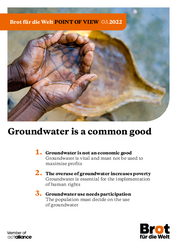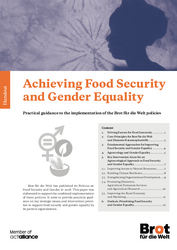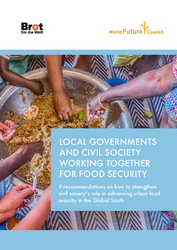
Secure Food Supply through Agroecological Farming
Even though enough food is produced worldwide to nourish everyone, food shortages and famine continue to arise. To ensure that adequate food lands on the right tables, Brot für die Welt (Bread for the World) and its partners have developed ideas that help.
There is Enough for Everyone!
Food shortages no longer need to be a global issue. There is more than enough food for the more than seven billion people in the world. That people are still starving is caused by unequal access to food, food wastage and loss as well as the use of foodstuffs for purposes other than human consumption. But above all, many people lack sufficient income to buy food. In addition to a sufficient supply of food, however, the quality of the food is crucial. Often it lacks important nutrients and vitamins. The diet is unbalanced, resulting in undernourishment and malnutrition.
The Facts
- Worldwide every ninth person suffers from hunger.
- Hunger harms not only the body, but also the psyche.
- More than 60 percent of the hungry are female.
- Paradox: Hunger is above all a rural problem, because many smallholder families possess too little land to feed themselves year round.
- Two billion people are malnourished or undernourished. More than one billion are overweight or obese.
- Almost 24,000 people per day die from the results of malnutrition and undernourishment.
Escaping Undernourishment and Poverty
In 2008, the Synthesis Report “Agriculture at a Crossroads”, compiled by 400 scientists at the behest of the World Bank and the United Nations set out what must be done in the coming decades to eradicate world hunger. The decisive factor is not increased agricultural productivity at all costs, but that food and the means of its production are available where they are needed. This is best achieved through smallholder structures. According to current findings in the Synthesis Report, so-called environmentally-friendly genetic engineering poses more problems than solutions and diverts the interest of agricultural research exclusively to patentable products.
It is also necessary to prevent the conversion of food cropland into fuel cropland. Fishing and wild fruits are also important for a sufficient supply of vitamins and protein. In addition, it is essential to strengthen women's rights in agriculture and fisheries in developing countries and to implement the concept of food sovereignty. This means that the interests of the people worldwide who produce food on arable land and pastures, in forests, rivers and oceans are at the centre of attention. All this contributes to rural development that opens up economic and social prospects on the one hand, and reduces poverty and hunger on the other.
What Brot für die Welt Does
This is why Brot für die Welt, along with its partners, is committed to ensuring that smallholders have sufficient land to provide the family with sufficient and healthy food throughout the year. They must retain control over their seeds in order to avoid dependency on seed producers and banks. And they must know how to cultivate their land so that it will remain fertile in the long term and for future generations, even in times of climate change. Brot für die Welt also supports small-scale fishing, indigenous peoples and herders in sustainably strengthening their contribution to combating hunger and malnutrition.
At the international level, Brot für die Welt and its partners are also committed to ensuring that the right to food is not only words on paper. This also means that agricultural and fisheries policies in African, Asian and Latin American countries should be framed to strengthen rural agriculture and fisheries and eliminate hunger. Neither should regional agricultural products be forced off the world market by subsidised cheap imports, nor should food prices be fuelled by food speculation. In Europe and Germany, Brot für die Welt is committed to fair trade agreements with developing countries and against agricultural subsidies that discriminate against products from less developed countries.
Whether it is possible to adequately feed all people depends not least on whether it is possible to halt climate change. Industrial nations like Germany have a particular duty here as the problem has been to a large extent caused by our lifestyle. We therefore not only support our partner organisations in specific local climate adaptation projects, but also advocate an ambitious climate protection policy in Germany and Europe.
Download





